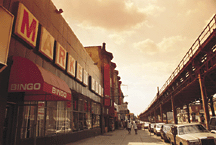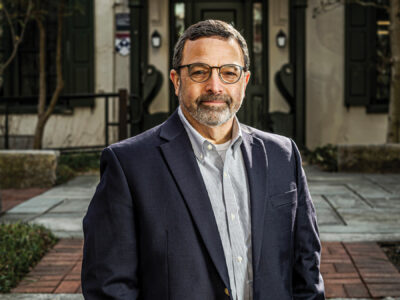Regular game. Nothing free.
By Jeffrey Barg

Left hanging in the air,the one word seems to have a bit of trouble making its way through the dense cigarette smoke that fills the room. The stale haze, so thick that all of the giant hall’s objects seem to have slightly blurred and uncertain edges, puts the entire building into a carcinogenic time warp. Four rows of identical booths run up and down the great hall, with tired, worn-down wood countertops and slightly bent-out-of-shape cushioned metal chairs occupied by women and men, young and old—although the great majority are elderly women—all of whom also seem a bit tired and bent out of shape. But for today, being out of the house and among friends is enough to raise their spirits. And for a woman named Thelma, sitting four seats from the far end of the third row, it’s more than enough, because she just effortlessly picked her voice up from the table and pushed it happily into the smoke-filled room, saying with sass the one word that she’s been waiting to say since she sat down, just two short hours ago.
“Bingo!”
Tucked away just off the main drag of culturally vibrant but economically depressed West Philadelphia, Market Hall Bingo does not appear, at first glance, to be a locus of the community’s culture. Outside, along 52nd Street, lines of traffic—vehicular and human—move fast when in a hurry but take it easy when looking to make a little conversation or a little business. Gold-colored plaques sunk into the sidewalk and strongly reminiscent of the stars along Hollywood Boulevard proudly proclaim 52nd Street: West Philly’s Main Street. The street is not a lazy loitering ground where-everybody-knows-your-name, but neither is it a fast-as-you-can anonymous thoroughfare. It is a crucial artery of the city, where dollar-store owners and servers at greasy-spoon diners and baby strollers and corner-sitting card-players and sidewalk bootleg-movie vendors and neighborhood somebodies and busybodies and nobodies all holler, grumble, and laugh in perfectly pitched harmony.
West Philadelphia is a neighborhood where people care about and talk to their neighbors. Drugs and crime are rarely overwhelming, but can sometimes grow debilitatingly strong here, and neighbors need to keep each other informed as a basic skill of survival. Luckily for the community, that cautiously friendly care exists not just in times of crisis but in day-to-day conversations.
In addition to the standard neighborhood soundtrack, the Market-Frankford El periodically shrieks overhead, with passengers constantly arriving and departing. Amid all this activity and commotion, the nondescript facade of Market Hall between 52nd and 53rd on Market is hardly noticeable to anyone not looking for it. But just as Market Street doesn’t seem to pay any special attention to the bingo games that go on for 12 hours a day, inside the Hall, the outside world fades into the background as a woman sitting at the front on a throne of aluminum and plywood captures the attention of dozens of players.
“Regular game, nothing free,” declares the number caller at the start of the game. With that, the rules are laid out, and seconds later, she is calling the numbers fast and furious. Many more rules exist, such as the seven different ways to win, but those are understood by the regulars, who give quick explanations to the newbies.
“O-62. B-14. I-23.”
The caller recites the numbers into her microphone almost mechanically, giving each call the exact same tone and vocal inflection. Around the room, the players work frantically to keep up. This bingo is not just a game of called numbers; this is a test of skill and stamina.
“Any B,” she begins a new game, indicating that players can take any B as a free space. “G-54. B-7. I-18.”
The more skilled players, the ones who have been playing the longest, are usually detectable by the number of boards they choose to play. Games cost as little as 25 cents for six cards—with each card containing two separate playing boards. The most skilled players will play up to 12 cards at once, filling up their entire tabletops. They need two hands, a great wad of bingo chips, and near-superhuman skill to check each board for each number called, lay out the appropriate chips, and then see if they have won any of the seven possible ways.
“N-45. I-17. N-31.”
Through and between the games, the entire room rumbles with a constant, low chatter. People talk mostly to either their neighbors or themselves, drifting in and out of conversations just as they would walking along 52nd Street.
When a soft-spoken girl says “Bingo” but is not heard immediately, other, more aggressive voices rise up in her defense.
“She called ’Bingo!’ Did you get paid, girl? She better get paid.”
To the newbies around them, the regulars offer help and instructions on the unwritten rules of Market Hall bingo. “Just leave your money up there, and they’ll take away as you go.” “You can be playing two more cards, you know.” “Yeah, you better get ahead of the numbers, because sometimes, she just start flying.”
And after they’ve been at it for a while, the regulars walk around to say hello to everyone. Most of the names they know, but even those they don’t still get a friendly, “How you doing?”
If regulars don’t know someone, they stop to find out. “Just being newsy, you know?” explains Kim, a bingo regular on a short break, before she continues her rounds to greet each and every one of the 80 people playing bingo one Friday morning.
In a conference room off to the side of the hall with a long wooden table and comfortable, swivel-seats, Pamela Williams needs to instruct guests as to which chairs are broken and should not be used. She’s the executive director of the West Philadelphia Free School Community, the non-profit charity organization that runs Market Hall Bingo, and she helps to oversee the distribution of funds that come in from the game back into community programs.
“We’re working to bring families together,” she says, stressing the word families with a kind of pleading importance. “Once we get them going, we can set up programs where families mentor other families, and eventually, you can galvanize a community. And we’re talking extended families, not just husband and wife. All kinds of families—single-parent families, biracial families, single-sex families—as long as it feels like home.”
While some bingo players come to support the charity organization, most are there for the game. “Your basic bingo players don’t know about the charity behind it all, but the regulars are a part of the community,” Williams says. “Really, they are the charity.”
In her view, the charity involved is not the bounty won from a lucky bingo card; it’s the healthy nourishment and fulfillment reaped from interacting with members of a great, extended family. “It’s not even the money that gets them here,” she says. “It’s recreation—they come to see people. People know they can come here for a support group. They come for the fun, for the excitement. They come just to be newsy.”
As each winning board is confirmed, rarely does a player scream out with joy. Rather, the winner stays seated and enjoys a quiet, personal moment of victory, perhaps exchanging words with someone seated nearby and slightly masking a grin while moving onto the next game and becoming once again just another player caught up in the constant flurry of action. The cash prizes awarded are a bonus, but as with life passing on 52nd Street, no luck is reliable enough to count on for too long. Instead, the players rely on each other because they know that they can and they know that they must.
Jeffrey Barg is a senior history major from Philadelphia.




